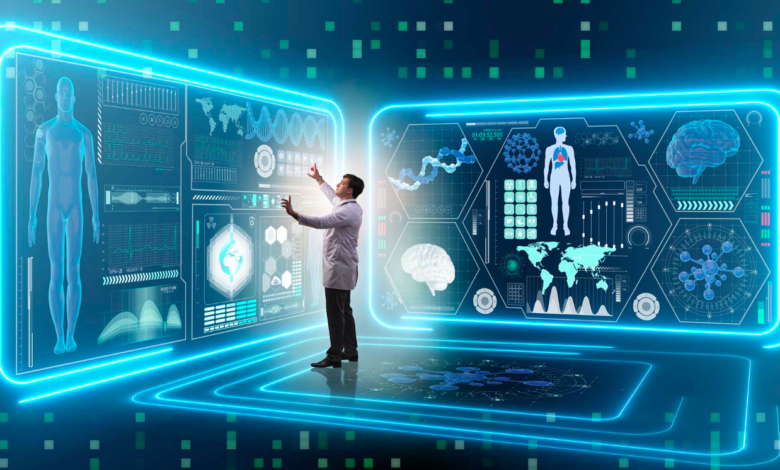The Future of Science: 5 Innovations That Will Shape Our World

Future of Science
As technology continues to advance at an unprecedented rate, the future of science is looking brighter than ever before. From medical breakthroughs to space exploration, there are countless exciting innovations on the horizon that will revolutionize the way we live, work, and interact with the world around us. In this article, we’ll take a closer look at five of the most groundbreaking innovations that are set to shape our world in the years to come.
-
Artificial Intelligence (AI)

Artificial intelligence is one of the most rapidly developing fields of science, and it’s not hard to see why. With AI, machines are able to learn, reason, and make decisions in a way that was once thought to be the exclusive domain of humans. From self-driving cars to chatbots, AI is already transforming the way we live and work.
In the future, AI will become even more integrated into our daily lives. We’ll see more and more applications for AI in healthcare, education, and finance, to name just a few examples. And with the development of quantum computing, we’ll be able to process massive amounts of data in real time, opening up new possibilities for machine learning and artificial intelligence.
-
Genomics
Our understanding of the human genome has come a long way in recent years, and this knowledge is set to have a profound impact on the future of medicine. With the ability to sequence and analyze DNA, we’re now able to diagnose and treat genetic disorders in ways that were once unimaginable.
In the years to come, genomics will play an even greater role in medicine. We’ll see personalized treatments and therapies that are tailored to an individual’s genetic makeup, as well as new drugs and therapies that target specific genes or proteins. And with the rise of gene editing technologies like CRISPR, we may even be able to cure genetic diseases at their source.
-
Quantum Computing
Quantum computing is still in its infancy, but it has the potential to revolutionize the way we process information. With the ability to perform calculations that are beyond the capabilities of classical computers, quantum computing has the potential to solve some of the most complex problems in science and technology.
In the future, we’ll see quantum computing being used for everything from simulating complex chemical reactions to optimizing logistics networks. And with the development of new quantum algorithms, we’ll be able to tackle even more complex problems in fields like cryptography and machine learning.
-
Renewable Energy
As the world becomes more and more conscious of the need to reduce carbon emissions and combat climate change, renewable energy sources are becoming increasingly important. From solar and wind power to geothermal and hydropower, there are countless ways to generate energy without relying on fossil fuels.
In the years to come, we’ll see even more innovation in the field of renewable energy. We’ll see advances in energy storage technologies, making it possible to store energy from renewable sources for use when it’s needed. And with the development of new materials and technologies, we may even see entirely new ways of generating clean energy.
-
Space Exploration
Exploring space has always captured the imagination of scientists and the general public alike, and it’s a field that’s set to see some major developments in the coming years. From new space telescopes to ambitious manned missions to Mars and beyond, the future of space exploration is looking very exciting indeed.
In the years to come, we’ll see new discoveries about the origins of the universe, as well as new technologies that make it possible to explore even further into the cosmos. And with the development of space tourism, more and more people will have the opportunity to experience the wonders of space for themselves.
Read More:Science vs. Pseudoscience: How to Spot Fake News and Misinformation
Conclusion
As these five examples show, the future of science is looking incredibly bright. From artificial intelligence and genomics to quantum computing, renewable energy, and space exploration, the possibilities for innovation and discovery are endless. These groundbreaking fields of science have the potential to transform our world in ways that were once thought impossible, and it’s exciting to think about what the future holds.
Of course, there are many other areas of science that are also advancing at an incredible pace, from nanotechnology and materials science to neuroscience and robotics. Each of these fields has the potential to make a significant impact on our world, and it’s clear that the future of science is full of promise.
At the same time, it’s important to remember that science is only one piece of the puzzle when it comes to shaping the future. To truly make a difference, we need to think about how these advances can be used to address the many challenges facing our world today, from climate change and inequality to global health and education.
Ultimately, the future of science is not just about new technologies or groundbreaking discoveries, but about how we use these advances to make a positive impact on the world around us. With that in mind, it’s up to all of us to think creatively, work collaboratively, and use the tools of science and technology to create a better future for ourselves and for generations to come.











